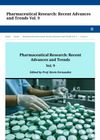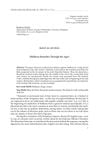 13 citations,
January 2014 in “PubMed”
13 citations,
January 2014 in “PubMed” Adiantum capillus-veneris Linn reduced hair loss and improved hair growth in mice with testosterone-induced alopecia.
 7 citations,
January 2019 in “Brazilian Journal of Pharmaceutical Sciences”
7 citations,
January 2019 in “Brazilian Journal of Pharmaceutical Sciences” Maidenhair fern extract reduced anxiety and depression in rats and may work due to its antioxidant and anti-inflammatory properties.
4 citations,
October 2018 in “Journal of drug delivery and therapeutics” Hansraj is effective for various health issues but should not be used during pregnancy.

Maidenhair fern has traditional and modern uses for treating hair loss and other health issues.

Maidenhair fern extract may help treat COVID-19 symptoms.
 April 2019 in “International research journal of pharmacy”
April 2019 in “International research journal of pharmacy” Adiantum capillus extract reduces pain and swelling in animals.

The extract from the plant Adiantum capillus-veneris might be used to treat COVID-19.

Maidenhair fern extract might help treat COVID-19 symptoms, but more research is needed.

Maidenhair fern might help with COVID-19 symptoms, but it needs more testing.
 1 citations,
June 2023 in “International journal of basic science in medicine”
1 citations,
June 2023 in “International journal of basic science in medicine” Adiantum capillus-veneris may help with respiratory issues, but more research is needed.
 January 2023 in “Eurasian journal of science and engineering”
January 2023 in “Eurasian journal of science and engineering” Medicinal plants in Kurdistan have potential health benefits and need more research for drug development.
 170 citations,
September 2019 in “Evidence-based Complementary and Alternative Medicine”
170 citations,
September 2019 in “Evidence-based Complementary and Alternative Medicine” Some medicinal plants can help heal wounds and may lead to new treatments.
 33 citations,
September 2017 in “Molecules”
33 citations,
September 2017 in “Molecules” Red ginseng oil and its components help promote hair regrowth and could treat hair loss.
 30 citations,
January 2000 in “Dermatologic Clinics”
30 citations,
January 2000 in “Dermatologic Clinics” Finasteride and minoxidil are effective FDA-approved treatments for androgenetic alopecia.
 27 citations,
February 2017 in “Biomedicine & Pharmacotherapy”
27 citations,
February 2017 in “Biomedicine & Pharmacotherapy” White wax and policosanol from white wax effectively reduced hair loss and promoted hair growth in mice better than a known hair growth drug.
 23 citations,
January 2021 in “Biomedicine & Pharmacotherapy”
23 citations,
January 2021 in “Biomedicine & Pharmacotherapy” DHT stops hair regrowth in mice, similar to human hair loss.
 16 citations,
September 2018 in “Journal of Ethnopharmacology”
16 citations,
September 2018 in “Journal of Ethnopharmacology” Plant-based remedies may treat hair loss by reducing inflammation and improving insulin resistance.
 6 citations,
April 2023 in “Frontiers in plant science”
6 citations,
April 2023 in “Frontiers in plant science” Certain bacteria can boost lentil growth and improve soil used for farming.
 6 citations,
August 2020 in “Journal of Pharmaceutical Innovation”
6 citations,
August 2020 in “Journal of Pharmaceutical Innovation” Nanoemulgel improves hair growth and quality using finasteride without irritation.
 5 citations,
January 2021 in “Biomedicine & Pharmacotherapy”
5 citations,
January 2021 in “Biomedicine & Pharmacotherapy” Policosanol helps treat hair loss by balancing hormones and supporting hair growth.
 4 citations,
October 2016
4 citations,
October 2016 Herbs like aloe vera and amla are effective and safe for treating hair loss.
 January 2024 in “Journal of Natural Remedies”
January 2024 in “Journal of Natural Remedies” Solanum nigrum extract may help regrow hair.
 October 2023 in “Cognizance journal”
October 2023 in “Cognizance journal” The document suggests using natural remedies like bloodletting and honey for various health issues but lacks scientific evidence for their effectiveness.
 October 2023 in “International journal of biology, pharmacy and allied sciences”
October 2023 in “International journal of biology, pharmacy and allied sciences” Henna helps wounds heal faster and better.
 January 2023 in “Acta historiae medicinae, stomatologiae, pharmaciae, medicinae veterinariae”
January 2023 in “Acta historiae medicinae, stomatologiae, pharmaciae, medicinae veterinariae” Historical baldness remedies were varied and often based on superstition.
 January 2022 in “Acta botanica Caucasica”
January 2022 in “Acta botanica Caucasica” Turkish herbal cosmetics use various plants for hair care, skincare, and other personal hygiene purposes.
 June 2022 in “International journal of drug delivery technology”
June 2022 in “International journal of drug delivery technology” Convolvulus arvensis ethanolic extract can potentially promote hair growth and reduce hair loss.
 September 2023 in “Cureus”
September 2023 in “Cureus” Topical finasteride might be a good alternative for hair loss treatment with fewer side effects, but more research is needed.
April 2021 in “Texila international journal of academic research” Both topical and oral finasteride are equally effective for treating male pattern baldness.
24 citations,
June 2013 in “Journal of neuroendocrinology” Neuroactive steroids and the enzyme 5α-reductase might be involved in the development of Tourette's syndrome.



























